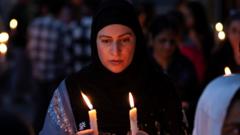Following a recent attack in Kashmir that resulted in tragic civilian casualties, Kashmiri individuals and vendors in India are confronting escalating violence and discrimination, leading many to fear for their safety and return home.
Kashmiris Under Siege: Rising Violence and Fear After Deadly Attacks

Kashmiris Under Siege: Rising Violence and Fear After Deadly Attacks
Kashmiris in India face severe backlash, suffering violence and harassment following a terrorist attack that left 26 people dead.
In the picturesque hilltown of Mussoorie, Shabir Ahmad Dar has had his livelihood shattered. For over two decades, this proud purveyor of delicate pashmina shawls has celebrated the traditions of his home region of Kashmir through his work. However, recent violence tied to a deadly attack in Kashmir has turned his identity from a point of pride into a source of fear.
Dar and another shawl seller were recently assaulted by a Hindu right-wing group, incensed by the killings in Kashmir. Video footage captured the harrowing encounter as the assailants hurled abuse while vandalizing their stall. “They told us to leave and never return,” Dar recounted, voicing the fears that compelled him and other Kashmiri vendors to vacate Mussoorie after years of residing there safely. Despite police intervention that resulted in the arrest of the perpetrators, they were swiftly released, highlighting a worrisome pattern of impunity.
The attack in Pahalgam, which claimed the lives of 26 individuals, has intensified scrutiny and persecution towards Kashmiris across India. Storeowners, students, and everyday citizens have reported harassment in various cities, as public sentiment has turned sharply against them. Many have shared stories of being ostracized or outright assaulted simply for their Kashmiri identity. Ummat Shabir, a nursing student subjected to accusations of terrorism, described harrowing experiences where strangers expressed hostility upon learning her origins.
As security forces escalate operations in Kashmir, apprehensions mount among the civilian population. Families are facing crackdowns, including mass detentions and home demolitions purportedly linked to suspected militants. Critics of these measures argue that they amount to collective punishment, driving a wedge deeper between ordinary Kashmiris and the authorities.
The sentiments of frustration and vulnerability felt by Kashmiri residents have been voiced by numerous individuals, including well-known figures like Jammu and Kashmir Chief Minister Omar Abdullah and novelist Mirza Waheed. It is clear that many Kashmiris perceive a continuous cycle of guilt and suspicion weighs heavily upon them, as violence and conflict surrounding their territory create an atmosphere of fear and distrust.
The current situation has sorely tested the resilience of the Kashmiri people. Daily wage worker Mohammad Shafi Dar’s story encapsulates the grim realities faced by many; having turned to the streets with his family after losing their home to military actions, he represents the staggering toll that this conflict continues to exact on innocent lives.
As Kashmiris navigate the turbulent landscape of their identity, the search for justice and peace remains urgent. Amid growing fears of violence, many continue to hope for unity and healing rather than division and strife.
Dar and another shawl seller were recently assaulted by a Hindu right-wing group, incensed by the killings in Kashmir. Video footage captured the harrowing encounter as the assailants hurled abuse while vandalizing their stall. “They told us to leave and never return,” Dar recounted, voicing the fears that compelled him and other Kashmiri vendors to vacate Mussoorie after years of residing there safely. Despite police intervention that resulted in the arrest of the perpetrators, they were swiftly released, highlighting a worrisome pattern of impunity.
The attack in Pahalgam, which claimed the lives of 26 individuals, has intensified scrutiny and persecution towards Kashmiris across India. Storeowners, students, and everyday citizens have reported harassment in various cities, as public sentiment has turned sharply against them. Many have shared stories of being ostracized or outright assaulted simply for their Kashmiri identity. Ummat Shabir, a nursing student subjected to accusations of terrorism, described harrowing experiences where strangers expressed hostility upon learning her origins.
As security forces escalate operations in Kashmir, apprehensions mount among the civilian population. Families are facing crackdowns, including mass detentions and home demolitions purportedly linked to suspected militants. Critics of these measures argue that they amount to collective punishment, driving a wedge deeper between ordinary Kashmiris and the authorities.
The sentiments of frustration and vulnerability felt by Kashmiri residents have been voiced by numerous individuals, including well-known figures like Jammu and Kashmir Chief Minister Omar Abdullah and novelist Mirza Waheed. It is clear that many Kashmiris perceive a continuous cycle of guilt and suspicion weighs heavily upon them, as violence and conflict surrounding their territory create an atmosphere of fear and distrust.
The current situation has sorely tested the resilience of the Kashmiri people. Daily wage worker Mohammad Shafi Dar’s story encapsulates the grim realities faced by many; having turned to the streets with his family after losing their home to military actions, he represents the staggering toll that this conflict continues to exact on innocent lives.
As Kashmiris navigate the turbulent landscape of their identity, the search for justice and peace remains urgent. Amid growing fears of violence, many continue to hope for unity and healing rather than division and strife.






















